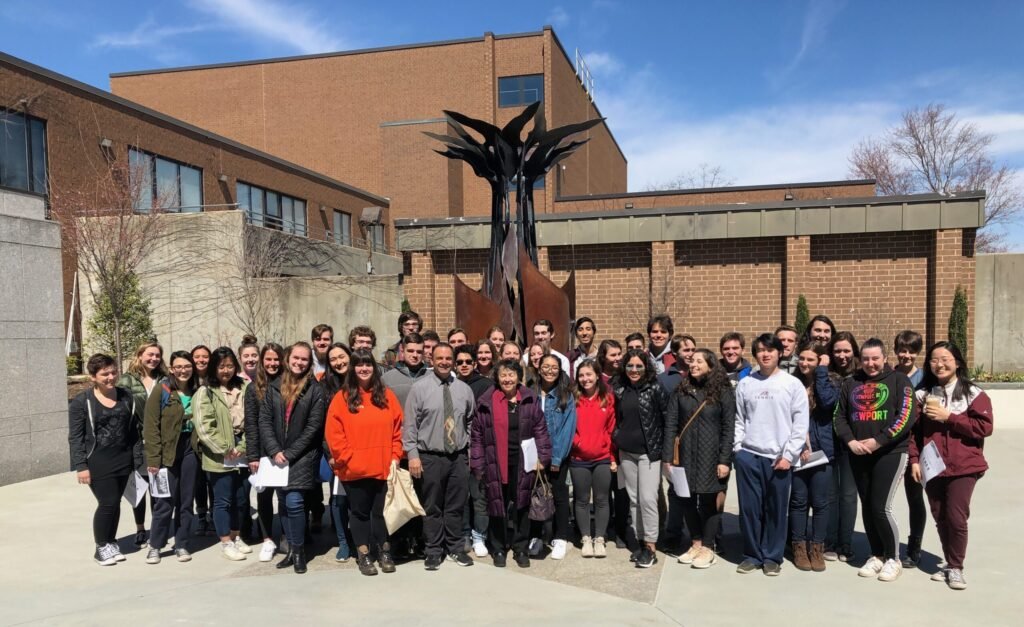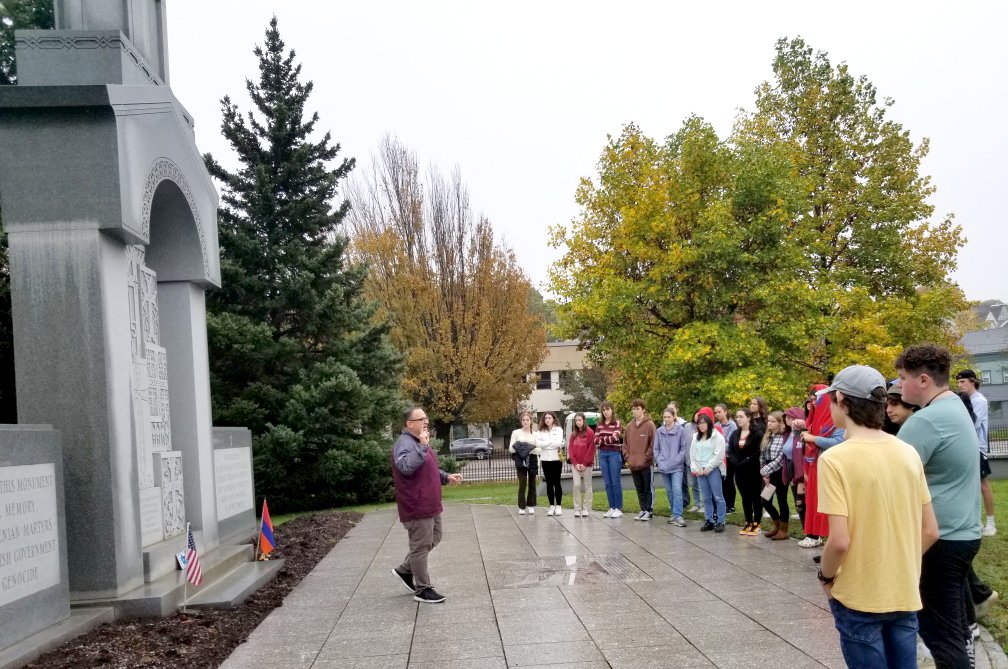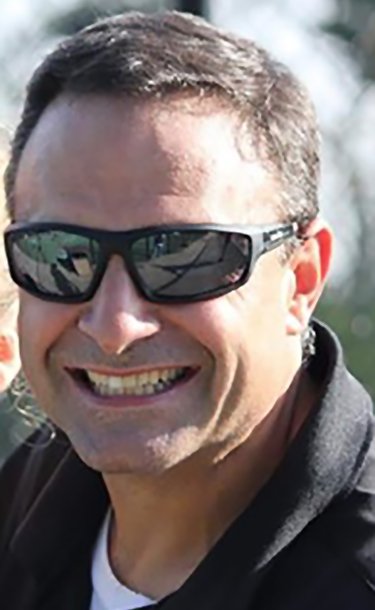Special Issue: Genocide Education for the 21st Century
The Armenian Weekly, April 2023
Thinking about the past has always been a passion of mine, and family history is important to certain members of every family. I never fully understood this until I had the great fortune of joining the Halvajian/Ashukian family in the fall of 1993. As an aspiring teacher, I listened to the stories about the Armenian Genocide from my new family members and grew to recognize the impact it had on a generation of Armenians—a generation that deals with the horrific knowledge that lives would never be fully realized or recognized and that families would be forever ruptured with relatives who never came home. Generations of Armenians would not have the opportunity to contribute to this world and leave their legacy. The unimaginable events of World War I are increasingly and globally confirmed as a genocide by more and more countires and leaders every year; President Biden recognized the Armenian Genocide on April 24, 2021. As a young man, listening to these stories during family dinners, and every November on a larger scale at Sts. Vartanantz Armenian Apostolic Church bazaar in Providence, RI, had a tremendous impact on me.
In the early 2000s, I attended a conference on the Holocaust at the University of Rhode Island, which led to an awe-inspiring trip to the United States Holocaust Memorial Museum in Washington, DC. That led to another conference on the Armenian Genocide at Rhode Island College. Initial interest can ignite imagination. Wonder can lead to action. These two specific encounters led to the creation of a history class titled Genocides of the Twentieth Century, which has been in existence since 2006 at East Greenwich High School (EGHS) in RI. Having the right people around you makes all the difference in the world when you are trying to build something from scratch. Esther Kalajian and Pauline Getzoyan, along with Tim McPartlin (department head of East Greenwich High School) and Mike Levine (former principal of East Greenwich High School) were just the people needed to help move this course out of the development phase and into the program of studies at EGHS.
Since 2006, we have offered two to four classes per year. The classes are often at capacity, and students have visited me to ask to be put on a waiting list to gain admission to a section. The course has become one of the most popular electives in the social studies department, if not in the entire school. Due to the content, the class is restricted to juniors and seniors, which makes its popularity even more impressive. The class is offered at the college preparatory level, making it available to all upperclassmen–with no prerequisite–further expanding its accessibility. It is a class that has evolved over time and will continue to do so as world affairs dictate discussions and curriculum. East Greenwich High School is also in compliance with RI state law that requires exposure to and instruction in the Holocaust and genocides by the time students graduate from high school.

The course uses primary source documents, films, websites, novels and field trips, among other materials to provide students with a well-rounded experience culminating in a unique final presentation at the end of each semester. It is designed to engage students on a variety of levels that challenge them to dive into important philosophical discussions. Man versus man; good versus evil; why is there suffering in the world; what role does religion play; what causes human brutality; and what are the forces that shape the worst in us are just a few of the many essential questions students are asked to answer throughout the semester. While the class covers the history of events, it’s also philosophical in nature, leaving open the chance to engage in rich class discussions that broaden the minds of young adults and encourage spirited, lively conversation during instruction. The two main anchors of the course are the the Armenian Genocide and the Holocaust. Students have familiarity with World War I and World War II by the time they are eligible for the class, and this makes teaching these events even more important. While virtually every student has had some exposure to the Holocaust, almost no students recall or know about the Armenian Genocide. In some cases, students are shocked to learn that the Armenian Genocide is WWI’s greatest atrocity, and yet, it is rarely taught or discussed. What may be more egregious is how world affairs and the geopolitical debate can dictate the official response of the United States when it pertains to what happened to the Armenians over 100 years ago. Students learn about the parallels between the Armenian Genocide and the Holocaust and draw their own conclusions based upon the evidence.
The use of films and a novel plays an important part in the class and helps to bring a human element to their experience. Schindler’s List, The Promise, Defiance and Hotel Rwanda bring these important events in history to life in a way that students understand. Students also read the book Never Fall Down. The novel is leaves such an impression that students often ask to take a copy home or read it outside of class. The method used in telling the story of Arn (a young boy assigned to a Cambodian labor camp then turned child soldier) is very authentic, and students can visualize a vivid picture of the scenes described throughout the book. These different forms of media play a vital role in the educational process and show students how ordinary people can do extraordinary feats against the toughest of odds, even in the most difficult situations.

There have been many memorable class experiences, but the bi-annual field trip and final presentation are the top two choices of the students. Every semester, we visit downtown Providence to walk through Memorial Park, just off South Main Street. Students can walk from the pedestrian bridge to the park and take in the beautiful memorials, while listening to an audio tour of the RI Holocaust Memorial. Students also visit the North Burial Ground in Providence. There, students learn the history of the Armenian Martyrs’ Memorial Monument dedicated on April 24, 1977, and the Memorial Pedestal dedicated on the 100th anniversary of the Armenian Genocide on April 24, 2015. Following these two stops, we often travel to the Sandra Bornstein Holocaust Education Center for a tour of the facilities and to hear a speaker, usually discussing the Holocaust. Over the years, students have heard from a Jewish rabbi, a passenger on the Kindertransport (Children’s Transport), and most recently, they heard and asked questions of internationally-recognized Rwandan genocide survivor and human rights activist Jacqueline Murekatete.
Our final presentation of the semester challenges students to think about the future and the role the United States plays when it concerns the issue of genocide globally. The simulation is an adaptation of the Brown University Choices Program. Students use what they’ve learned throughout the semester and get a more concentrated look at genocide from the use of primary source documents and a series of important eyewitness testimony videos. They learn what America knew about the Armenian Genocide through a series of headlines and articles in The New York Times in 1915. All of this work culminates in a simulation the students conduct on the final two days of the project. They are tasked with deliberating four different policies the United States could adopt by asking a series of questions for better clarification of the policy. The background information is paramount to their role, and students can use real historical events to argue their points.
Once the presentations are complete, the real work begins. Students analyze the policies and then craft their own policy based on history, research and their own beliefs. They can adopt a policy they learned during the simulation, combine policies or draw on their experiences throughout the semester to write something completely different. After drafting the new policy for the United States, it’s time to put their work to the test. Students are given a global case study, and they must examine their policy as it would pertain to the hypothetical crisis identified and assess its effectiveness in the conflict. Our final exam is challenging given the global community, the United Nations and the sovereignty of other countries. The world is continuously more and more intertwined; the lines–especially economically–are blurred as countries scour the earth for trade opportunities with nations and open up new markets to capitalize on business ventures and opportunity. As students begin to realize just how difficult every decision really is, be it political, humanitarian or morally just, these decisions are no longer black and white; they are fraught with varying shades of gray, even if that decision is to stop the senseless killing of innocent people. Our semester does end with hope, as they provide a potential plan to end genocide forever. Maybe someday their dreams can be realized.
I am forever grateful to the students of East Greenwich High School for their thoughtful and articulate responses to the class as a whole and how they approach the final exam. Their empathy and understanding of a complex subject inspires me to work harder and design a course worthy of their participation. Throughout my 24-year career, seventeen of which have been spent teaching Genocides of the Twentieth Century, I am continuously amazed at how fortunate I am to be in this district working in a profession that is so vitally important to society. Interacting with students who think about the world around them and who apply the knowledge they gain may be the greatest gift of all.



Be the first to comment